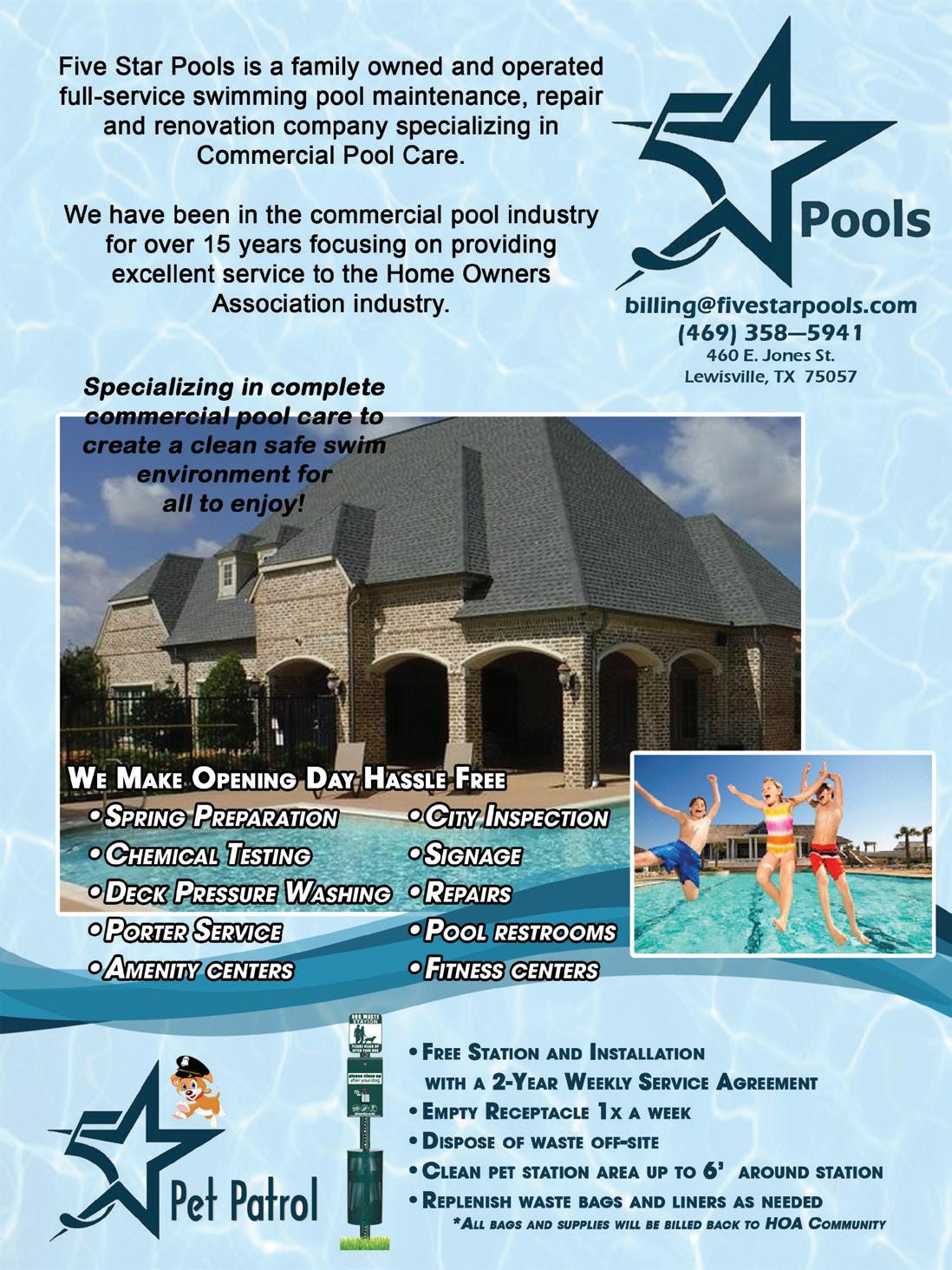
9 minute read
The Association Annual Checklist
The Association Annual Checklist: A Tool That Demonstrates Diligence and Value
By Brady Ortego
The new year is well underway, with the holidays just a fond memory now, and it is back to business as usual. But before getting too far into the year, it is probably a good idea to examine how things are running in the community. Many managers keep their amenities running smoothly by conducting annual maintenance inspections. But did you know community associations should be doing the same as a corporation? I will discuss the reasons to inspect the association as a corporation and its document database as well as present annual checklists for both single family and condominiums, which allow association management to demonstrate the value it brings to the business relationship with the association. If your community is self-managed, the board of directors can use the checklist to demonstrate transparency and diligence to community members. Remember the Basics
As you start your inspection, it is important to keep things simple as you begin. Forgetting the simple things can cause your association’s board or the members to lose faith.
Before starting the inspection of your association, it is important to do a self-examination and refresher of your industry knowledge. Are you up to date on case law and legislative changes? If not, it is important to have the correct information on the law so you will know how to handle any situation that arises in your association. A great resource we are happy to provide is our Quick Reference Guide for Single Family Homeowner Associations (and Townhomes) and Condominium Associations. These reference guides offer easy access to many of the statutes in the Texas Property Code directly affecting associations. If you do not have a copy, let us know and we will be happy to send you one. Now that you are up to date, it is time to make sure your association is ready for the rest of the year ahead. Start by creating a checklist to use during your inspection. We have provided example checklists on pages six and seven. The checklist will help you keep track of your progress during your inspection. Is the Association Information Correct?
You should begin your inspection by ensuring your association’s information is correct. Property owners’ associations are usually non-profit corporations1, and thus are required to have many documents filed with the state.
Make sure the registered agent is current and not a former developer, board member, or community manager or former management company. The law requires the registered agent and registered address to be updated. The Texas state comptroller’s website provides a useful resource to check for registered agents. https://mycpa.cpa. state.tx.us/coa/search.do?userType=public Next, confirm you have a copy of the deed(s) for the association’s private streets, reserves, amenity property and any other association-owned land in single-family & non-condominium townhome associations.
A condominium association will not have a deed for the common elements.
Taxes Come for Everybody While most associations are non-profits2, you still need to take the time to confirm the association’s corporate status. After completing this step, confirm if the association is exempt from the franchise tax.
The Texas state comptroller’s website will provide much of the information you need in relation to tax exemption status. https://mycpa.cpa.state. tx.us/coa/search.do?userType=public While on the comptroller’s website, ensure the “Right to Transact Business in Texas” is listed as “Active.”
As we have stated, and hopefully by now you have confirmed, many associations are non-profits and tax exempt, but that does not mean your association is exempt from all taxes. You should confirm you are receiving a tax bill on real property owned by the association. Not only should you confirm it, but you should also pay the bill. But before paying, you should review each tax bill for the appraised value of the property owned by the association. Association owned property should be appraised at a nominal
value, which greatly reduces the tax liability for common areas. If your association is paying property taxes based on a full market value (not nominal), speak to a lawyer or the appraisal district immediately about changing the valuation. It’s All in the Details
We have now reached the portion of your inspection where the devil is in the details. Analyze your management certificate. Is it up to date and compliant with the Property Code? Examine the certificate closely to ensure the following information is correct: 1. the name of the subdivision; 2. the name of the association 3. the recording data for the subdivision; 4. the recording data for the declaration; 5. the name and mailing address of the association; Chapter 82.101 Texas State Property Code. Condominiums are required to be incorporated. 6. the name and mailing address of the person managing the association or the association’s designated representative; and 7. other information the association considers appropriate.

After examining your management certificate, it’s time to read your Dedicatory Instruments. Once you have read them, (we recommend re-reading the Dedicatory Instruments as many times as possible) confirming they are filed with the county or counties the property they relate to is located, per Texas Property Code Section 202.006.
Finally, we come to the policies of your association. Review your mandatory policies, such as your access to records and copying policy, your payment plan policy and records retention policy, confirming you, as a manager and an association, have been following the policies correctly. Then, review any permissive policies ensuring you are up to date on what standards your board has set for the community and you are prepared for any changes that may occur to the policies throughout the year. Each community is unique, and some policies may need to be revised to achieve the goals of the policies. At the end of your inspection, add one final step – a reminder to conduct the review again in a year. Once you have accomplished these steps, you and your association should be set to serve the community in the year ahead.
©2020 RMWBH PC
Brady Ortego is an Equity Shareholder in the firm’s San Antonio office and is a member of the Real Estate section as a leader of the Community Association Team. His practice areas include Community Association Law where he represents a variety of property owners’ associations across the state of Texas. He is Board Certified in Residential Real Estate Law and Property Owners Association law by the Texas Board of Legal Specialization and a Fellow in the College of Community Association Lawyers. Brady shares his experience and knowledge through a myriad of education avenues from State Bar of Texas seminars, Community Associations Institute events and customized presentations to boards of directors and management companies.


DOCUMENT/ACTION
Confirm the association in good standing with the Texas Comptroller ’ s Office Confirm the association in good standing with the Texas Secretary of State Confirm that the registered agent/address is current/accurate Confirm Management Certificate is recorded and updated to include reference to all dedicatory instruments adopted and recorded since the last Management Certificate Confirm recording of the Records Production and Copying Policy as required by Section 209.005(i) of the Property Code Confirm recording of the Records Retention Policy as required by Section 209.005(m) of the Property Code
DATE COMPLETED
Confirm recording of the Alternative Payment Schedule (aka Payment Plan Policy) as required by Section 209.0062 of the Property Code Guidelines relating to: 1. Rain barrels and rain harvesting systems; 2. Solar energy devices, storm and energy efficient shingles; 3. Flags and flag poles 4. Display of religious items 5. Drought-resistant landscaping and water-conserving natural turf; 6. Standby electric generators NOTE: The above guidelines are not required; however, we highly recommend an association adopt such in order to restrict/enforce the use of these items. (Chapter 202 of the Property Code) Collection Policy* Deed Restriction Enforcement Policy* Fining Policy*
Social Media Policy* Hearing Policy in relation to fining* Are there anypolicies, rules and regulations, or other dedicatory instruments or amendments thereto that have been adopted but are not recorded? (Section 202.006 of the Property Code requires recording of all dedicatory instruments as a condition of enforcement)
* not required, but highly recommended
Please note that this may not be an exhaustive list of all the potential policies or guidelines that may be prudent for your community. In many cases, there may be a policy that is prudent based on the individual needs of a community that may not be mentioned here. This checklist is best utilized when a new community is engaged with the management entity,but best practices provide that annual review and consideration of the above items will ensure that the Association’s corporate formalities and/or Dedicatory Instrument needs are satisfied. Thischecklist isprovidedmerelyasa guideandisnot intendedto providelegaladvice.Modification ofthischecklistisnot permittedwithout the express written consent of Roberts Markel Weinberg Butler Hailey PC and all rights are reserved.
© 2020 RMWBH, All rights reserved.



DOCUMENT/ACTION DATE COMPLETED
Confirm the association in good standing with the Texas Comptroller ’ s Office Confirm the association in good standing with the Texas Secretary of State Confirm that the Registered Agent/Address is current/accurate Confirm Management Certificate is recorded and updated to include reference to all dedicatory instruments adopted and recorded since the last Management Certificate Records Production and Copying Policy* Records Retention Policy* Application of Payments Policy* Maintenance Responsibility Matrix* Guidelines as needed for particular condominium. Examples include: 1. Move in/move out policy 2. Pet guidelines and registration 3. Interior modifications 4. Balcony/Terrace Guidelines Guidelines relating to: 1. Rain Barrels and Rain Harvesting Systems* 2. Solar energy devices, storm and energy efficient shingles* 3. Flags and flag poles* 4. Display of religious items* 5. Drought-resistant landscaping and water-conserving natural turf* 6. Standby electric generators* NOTE:Theaboveguidelinesare not requiredhowever wehighly recommend an association adopt such in order to restrict/enforce the use of these items. (Chapter 202 of the Property Code) Collection Policy* Fining Policy*
Social Media Policy*
Hearing Policy in relation to fining*
Insurance deductible policy (required under section 82.111 of the property code)
Are there any policies, rules and regulations, or other dedicatory instruments or amendments thereto that have been adopted but are not recorded? (Section 202.006 of the
Property Code requires recording of all dedicatory instruments as a condition of enforcement) * not required, but highly recommended
Please note that this may not be an exhaustive list of all the potential policies or guidelines that may be prudent for your community. In many cases, there may be a policy that is prudent based on the individual needs of a community that may not be mentioned here. This checklist is best utilized when a new community is engaged with the management entity,but best practices provide that annual review and consideration of the above items will ensure that the Association’s corporate formalities and/or Dedicatory Instrument needs are satisfied. Thischecklist isprovidedmerelyasa guideandisnot intendedto providelegaladvice.Modification ofthischecklistisnot permittedwithout the express written consent of Roberts Markel Weinberg Butler Hailey PC and all rights are reserved.
© 2020 RMWBH, All rights reserved.











